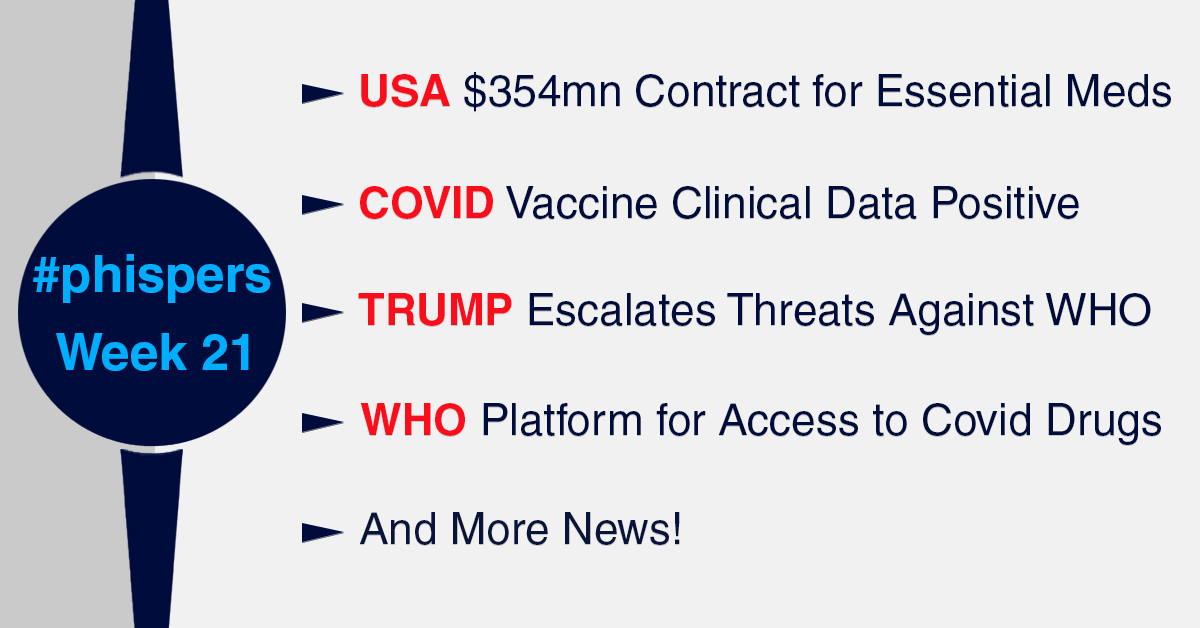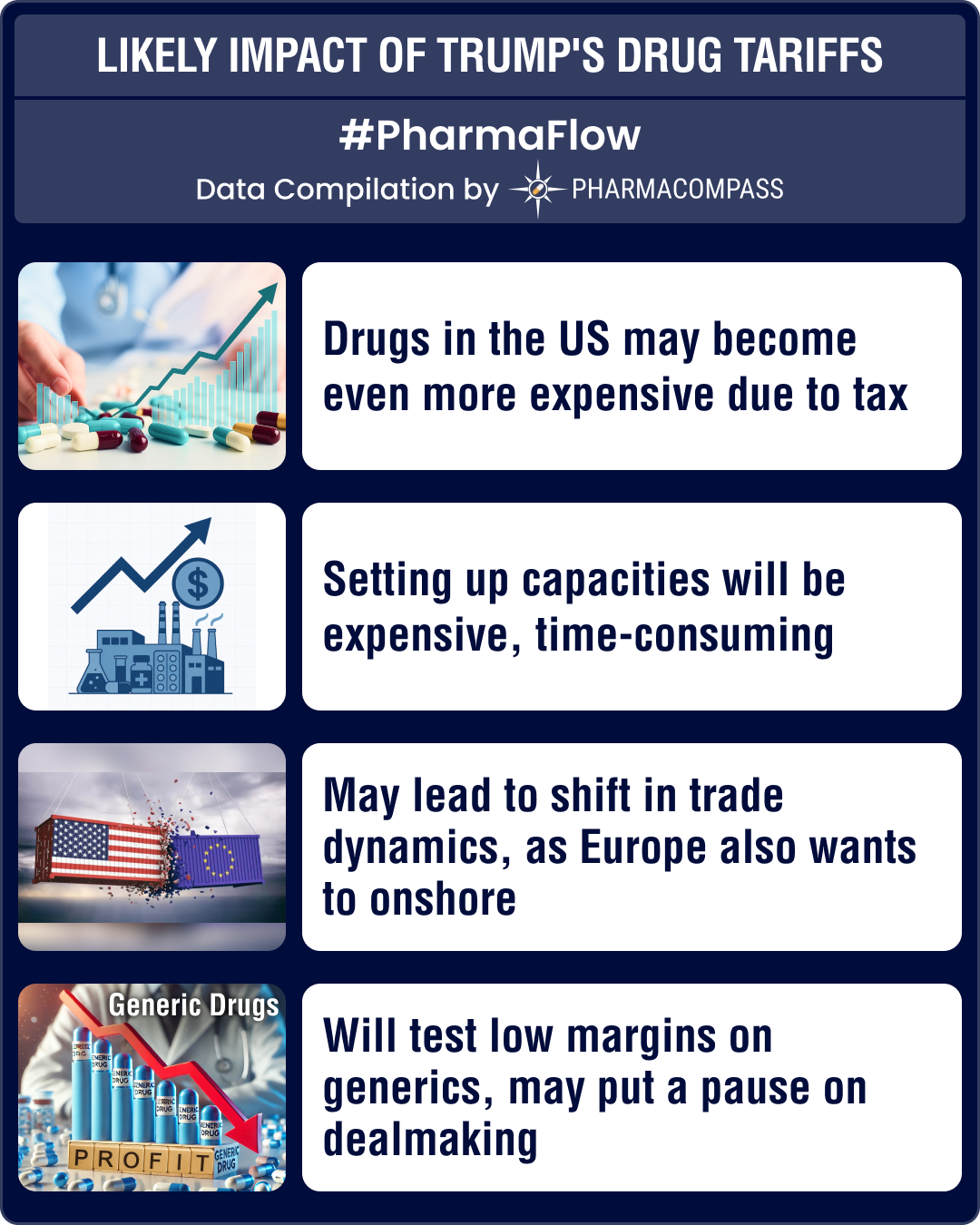
By PharmaCompass
2020-05-21
Impressions: 151943
This week, Phispers brings you lots of updates on vaccine development, news and rhetoric emerging out of the ongoing Covid-19 pandemic.
While Moderna posted positive results from the phase I clinical trial of its experimental vaccine, experts say the biotech has not revealed data from the trial for a proper evaluation.
There was lots of news coming out of the US, which has seen over 93,000 deaths due to the pandemic.
First, the US rolled out an ambitious plan — Operation Warp Speed — to develop and manufacture millions of Covid-19 vaccine doses by 2020-end. President Donald Trump threatened to permanently pull the country’s funding to the WHO, even as several member states backed a resolution strongly supporting the UN body.
The Trump Administration is also said to be working on an executive order that would require certain essential drugs to be made in the country.
Japan too is working on reducing its dependence on China for medical supplies and drugs, while India eased restrictions on the export of paracetamol.
The EMA has said that at best, it expects a vaccine against SARS-CoV2 by spring of 2021.
And the WHO, along with Costa Rica, are set to officially launch a technology platform that aims to lift access barriers to effective vaccines, drugs and health products against Covid-19.
White House likely to issue order mandating essential drugs to be made in US
The Trump Administration is preparing an executive order that would require certain essential drugs and medical treatments for a variety of conditions to be made in the US.
The order comes in light of drug and device shortages during the Covid-19 pandemic. And according to reports, the executive order may come this week. The applicable time frame for a review will be 90 days.
About 72 percent of pharmaceutical ingredient manufacturers supplying to the US are located overseas, including 13 percent in China.
“It is critical that we reduce our dependence on foreign manufacturers for essential medicines, medical countermeasures” to “ensure sufficient and reliable long-term domestic manufacturing” that prevents shortages and supplies to “mobilize our nation’s public health industrial base” when needed, says the nine-page draft.
The administration is learnt to be working on a wide-ranging supply chain effort in sectors that cater to national security issues, drugs, medical supplies, semiconductors and defense equipment.
Meanwhile, BARDA has offered a relatively unknown startup — named Phlow Corp — US$ 354 million to ramp up production of a list of drugs that may be at risk of running short in the US. The deal was inked by Eric Edwards, Phlow’s CEO who found himself in the middle of an ugly drug price gouging controversy a few years ago.
The total contract value awarded to Phlow is up to $812 million which includes a four-year base award of $354 million with an additional $458 million included as potential options for long-term sustainability.
Phlow announced that it is also building the United States' first Strategic Active Pharmaceutical Ingredients Reserve (SAPIR), a long-term, national stockpile to secure key ingredients used to manufacture the most essential medicines on US soil.
This includes chemical precursor ingredients, active pharmaceutical ingredients (APIs), and finished dosage forms for over a dozen essential medicines to treat hospitalized patients with Covid-19-related illnesses. Many of these medicines are in shortage and have previously been imported from foreign nations.
Japan also working on reducing import-dependence: Like the US, much of Japan’s supply of masks, gowns and gloves are also imported from China. Therefore, Japan too has begun to reduce its dependence on imported medical supplies. The Japanese government has started working with more than 400 domestic companies to bolster production at home.
Generic drugs are among the most vulnerable fields. Japanese producers import around half of their APIs from China, South Korea and elsewhere. About 40 percent of 45 Japanese pharmaceutical companies surveyed by Nikkei said their supply chains could dry up in half a year.
India to ease paracetamol exports: In India, the Central Drugs Standard Control Organization (CDSCO) has issued a letter to drug controllers in all the states and union territories to revoke export restrictions on major manufacturers of paracetamol APIs.
The letter states that six major manufacturers may be allowed to export up to 50 per cent of their monthly operating capacity in a given month subject to release of a similar quantity for domestic purpose.
Moderna releases positive Phase I clinical data on Covid vaccine
This week, biotechnology firm Moderna Inc announced results from its phase one clinical trial for its potential vaccine against the novel coronavirus. The results were encouraging as it boosted the immune system of participants to the same or higher levels of protection as patients who had recovered from the disease.
Announcing its interim results from the early stage trial, the Boston-based company said the vaccine candidate — known as mRNA-1273 — was safe and well tolerated by participants, with only minor side-effects. Moderna is developing the vaccine in conjunction with the National Institute of Allergy and Infectious Diseases’ (NIAID) Vaccine Research Center.
In a Phase 1 trial, eight patients who received two doses of the vaccine developed neutralizing antibodies to the virus at levels similar to people who had recovered from infection.
Moderna was the first US company to put a vaccine into human trials. Its messengerRNA approach allows it to effectively program a vaccine. However, a vaccine using this method has not yet been approved by any regulator.
However, there were several downsides to this trial. For instance, it had just 45 participants and the data on antibodies was only available for eight of those. And secondly, Moderna revealed very little information on the results, and therefore, there is really no way to know how impressive the vaccine maybe, says a STAT News report.
“If you ask scientists to read a journal article, they will scour data tables, not corporate statements. With science, numbers speak much louder than words,” the report said.
While the phase two trials on Moderna’s vaccine are starting soon, the company is likely to start a large phase three trial in July. The third trial will need to include thousands of participants, to demonstrate safety and efficacy across a large population.
Covid vaccine update: US rolls out Warp Speed; EMA says vaccine not before spring
Last week, the Trump administration announced Operation Warp Speed — an over-ambitious plan to develop and manufacture hundreds of millions of Covid-19 vaccine doses by the end of 2020. The US has seen 1.58 million Covid-19 cases so far, and over 93,000 deaths due to the pandemic.
The operation is headed by Moncef Slaoui, an ex-GSK vaccine head. Slaoui resigned from his position on the board of Moderna to accept the government appointment.
The project incorporates the Department of Health and Human Services, the Department of Defense and other agencies to advance promising vaccines against Covid-19, according to reports.
Slaoui’s appointment came up for criticism from numerous progressive groups in Washington as the former GSK vaccine head still holds over 156,000 Moderna stock options, worth over US$ 10 million at the company’s current stock price, creating a potential conflict of interest if the company’s vaccine is the first to be proven effective.
After an influential senator challenged that ownership interest, Slaoui said he is planning to sell his stake in Moderna.
Vaccine by spring, says EMA official: In Europe, a vaccine against SARS-CoV-2 could be approved in about a year, Marco Cavaleri, the European Medicines Agency’s top official overseeing anti-infectives and vaccines said.
“I have to stress that this is a best-case scenario,” he said during a virtual press conference. Cavaleri also said EMA expects all vaccines to prevent Covid-19 to be studied in large Phase 3 trials.
For drugs, approval could come sooner as many products being studied to treat Covid-19 are already approved for other indications or have been studied in humans for other conditions.
“It might be possible that before the summer, some of these therapeutics could be approved,” Cavaleri said. He also emphasized that EMA has been working closely with other regulators through the International Coalition of Medicines Regulatory Authorities (ICMRA) to ensure alignment on regulatory expectations for drugs and vaccines for COVID-19.
An extraordinary 110 Covid-19 vaccines are in development, and eight candidates—four from Chinese companies—have entered small trials in people, according to an update dated May 11 from the WHO. However, infectious disease experts, including Anthony Fauci, the US government’s top infectious disease researcher, have long warned that even optimistically, developing a Covid-19 vaccine would take between 12 and 18 months. Even that timeline, Fauci has said, would represent something of a biomedical miracle.
Sanofi’s vaccine backlash: Last week, French drugmaker Sanofi’s CEO Paul Hudson had said that once approved, the US will get first access to the company’s Covid-19 vaccine.
Hudson had told Bloomberg that the “US government has the right to the largest pre-order” of the experimental vaccine because a US agency, BARDA, has funded its development.
The following day, his statement met with swift backlash in France, both from his own company and a member of the French government. His comments had also upset President Emmanuel Macron.
Clarifying Hudson’s statement, the company said while vaccines from US production will be mainly preserved for Americans, production capacity elsewhere will supply Europe and the rest of the globe. The technology Sanofi uses for its Covid-19 vaccine candidate is primarily manufactured in the US, although the company said it is expanding capacity in existing facilities in Europe and elsewhere.
The controversy has raised questions over whether Europe has been too slow to respond in terms of organizing and funding vaccine research. Sanofi reiterated that the United States had moved more quickly in this regard.
Sanofi is working on two vaccine projects against Covid-19 — one with GSK that has received support from BARDA, and the other with the American company Translate Bio.
Oxfam has noted that governments “must work together to stop corporations profiteering from the pandemic and save the lives of people across the globe.”
Trump escalates threats against WHO; may permanently pull US funding
President Donald Trump escalcated his threats against the World Health Organization (WHO), telling the agency he will permanently pull US funding if it does not “commit to major substantive improvements in the next 30 days.”
As the pandemic worsens in the US, Trump has sought to blame both China and the WHO. “It is clear the repeated missteps by you and your organization in responding to the pandemic have been extremely costly for the world. The only way forward for the World Health Organization is if it can actually demonstrate independence from China,” Trump wrote in a letter to WHO Director-General Tedros Adhanom Ghebreyesus that he posted on Twitter this week.
“My administration has already started discussions with you on how to reform the organization. But action is needed quickly. We do not have time to waste,” Trump concluded, adding that the US will “reconsider” its membership unless unspecified improvements are made.
Trump's letter also mentioned that the WHO ignored “credible reports” of the virus spreading in Wuhan in early December 2019, including reports from The Lancet. However, the medical journal denied it published any such report in December 2019 referring to a virus or outbreak in Wuhan or anywhere else in China. According to The Lancet, the first report it published was on January 24.
Meanwhile, member states have backed a resolution strongly supportive of the WHO. On Tuesday, a resolution that backed the WHO’s leadership and said there needed to be an investigation into the global response to the coronavirus pandemic won endorsement at the WHO’s annual ministerial meeting.
Trump takes HCQ daily: Meanwhile, Trump said he is taking hydroxychloroquine (HCQ) to ward off the coronavirus, despite public health officials warning it may be unsafe. He told reporters he started taking HCQ recently. “I’m taking it for about a week and a half now and I’m still here, I’m still here,” he had said.
WHO to create tech platform to lift barriers to Covid vaccines, drugs
Back in March, Carlos Alvarado Quesada, the President of Costa Rica, had written to the WHO, requesting it to “undertake an effort to pool rights to technologies that are useful for the detection, prevention, control and treatment of the Covid-19 pandemic.”
On May 15, Alvarado and President of Chile, Sebastián Piñera, joined WHO Director-General Tedros Adhanom Ghebreyesus to announce progress on a technology platform that aims to lift access barriers to effective vaccines, medicines and other health products against Covid-19. WHO and Costa Rica will officially launch the platform on May 29. On that date, a ‘solidarity call to action’ will be published on WHO’s website where governments, research and development funders, institutions and companies can express their support.
The effort seeks to create a voluntary pool to collect patent rights, regulatory test data, and other information that could be shared for developing drugs, vaccines, and diagnostics. By establishing a voluntary mechanism under the auspices of the WHO, the goal is to establish a pathway that will attract numerous governments, as well as industry, universities and nonprofit organizations.
“We want to create a repository,” Alvarado said.
The World Health Assembly, which governs the WHO, is considering a resolution that, in part, embraces a voluntary pool in hopes of ensuring that less-developed countries can navigate patent rights for Covid-19 medical products. The WHO would be responsible for creating a framework for the pool. The resolution was submitted by the European Union, although the US has pushed back on certain provisions.
Virus may never go away: The coronavirus that causes Covid-19 could become endemic like HIV, the WHO said last week, warning against any attempt to predict how long it would keep circulating and calling for a “massive effort” to counter it.
It is important to put this on the table: this virus may become just another endemic virus in our communities, and this virus may never go away,” WHO emergencies expert Mike Ryan said.
The PharmaCompass Newsletter – Sign Up, Stay Ahead
Feedback, help us to improve. Click here
Image Credit : #Phisper Infographic by SCORR MARKETING & PharmaCompass is licensed under CC BY 2.0
“ The article is based on the information available in public and which the author believes to be true. The author is not disseminating any information, which the author believes or knows, is confidential or in conflict with the privacy of any person. The views expressed or information supplied through this article is mere opinion and observation of the author. The author does not intend to defame, insult or, cause loss or damage to anyone, in any manner, through this article.”








